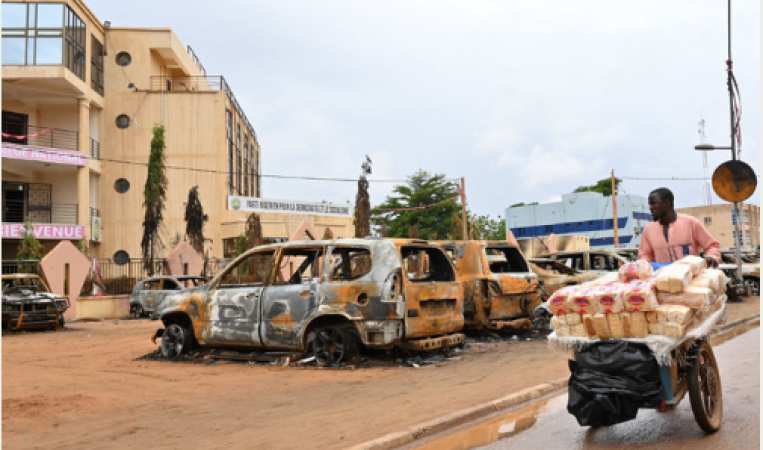
Naimey: The president of Nigeria, who also serves as head of the ECOWAS regional organisation, has not ruled out military action in Niger, but he thinks diplomacy is the "best way forward" to end the crisis, according to his spokesman on Tuesday.
For the first time since the Niger coup's soldiers disobeyed a Sunday deadline set by the bloc to restore the elected government of Mohamed Bazoum or risk using force, President Bola Tinubu voiced his opinion.
Ahead of a crisis summit on Thursday in the Nigerian capital Abuja, efforts by ECOWAS and the United States to negotiate with the new leaders of Niger have failed.
Also Read: Greece's Coast Guard Rescues 52 Migrants Stranded on Remote Island Oasis
A day after a top US envoy made no discernible progress during an unannounced visit, the US said it still held out hope for overturning the coup but was "realistic."
"We do have hope that the situation will be reversed, but at the same time, we are making clear, including in direct conversations with junta leaders themselves, what the consequences are for failing to return to constitutional order," State Department spokesman Matthew Miller told reporters.
The soldiers who took control of Niamey on July 26 earlier prevented an ECOWAS mission from going ahead of the summit. The coup leaders claimed in a letter that the delegation's safety might be in jeopardy due to public "anger" brought on by ECOWAS sanctions.
After the rebel soldiers overthrew Bazoum, ECOWAS—the Economic Community of West African States—imposed trade and financial sanctions on Niger.
The coup leaders disregarded the bloc's warning after giving Niger a seven-day deadline to restore Bazoum or risk using force.
Military intervention was not immediately anticipated, according to a source close to ECOWAS, and the way to dialogue appeared to be open.
Prior to the crisis summit scheduled to take place in Abuja, Nigeria's capital, on Thursday, the bloc attempted to send a delegation to Niamey on Tuesday.
However, according to the letter from the coup leaders, which was sent on Monday, "The postponement of the announced mission to Niamey is necessary, as is the reworking of certain aspects of the (delegation's) schedule."
The agenda "includes meetings with certain personalities which cannot take place for obvious reasons of security given the atmosphere of the threat of aggression against Niger," it said.
Also Read: Many people in post-coup Niger celebrate "liberation" despite protests
Since 2020, ECOWAS has experienced a string of coups that have affected four of its fifteen members.
The jihadist insurgencies that have driven at least two million people from their homes, claimed thousands of lives, and dealt crippling blows to some of the world's poorest economies have been the driving force behind the takeovers in Mali, Burkina Faso, and now Niger.
Veteran US envoy Victoria Nuland met with the military leaders of Niger on Monday for more than two hours, but she left with nothing. She referred to her speeches as "extremely frank and at times quite difficult."
She claimed that she presented "a number of options" to the coup leaders in an effort to put an end to the crisis and mend ties with the United States, which has suspended aid along with other Western countries.
Before leaving, she told reporters, "I would not say that we were in any way taken up on that offer."
General Abdourahamane Tiani, the new strongman of Niger, was not present at the meeting, so Nuland was unable to see Bazoum, who has been imprisoned since July 26.
Mali and Burkina Faso's military leaders have declared their support for Niger and warned against any military action, calling it a "declaration of war" against them.
President Abdelmadjid Tebboune of Algeria, which has a lengthy land border with Niger, has also warned against a military invasion, calling it "a direct threat" to his nation.
After winning elections in 2021 that marked the nation of Niger's first ever peaceful transfer of power, Bazoum, 63, was celebrated.
He assumed leadership of a nation that had already experienced four coups since its independence and resisted two putsch attempts before being overthrown.
Also Read: Defying Rivals, US Vows Steadfast UN Commitment to Curb Syria's Chemical Weapons Threat
His backing played a significant role in France's choice to withdraw from Mali and Burkina Faso and refocus its Sahel anti-jihadist mission on Niger last year. The majority of the French and American personnel—1,500 total—are stationed at two significant air bases in Niger.
Tuesday, Mali and Burkina Faso sent letters to the African Union and the United Nations urging them to forgo "military intervention against Niger" because the security and humanitarian repercussions of such a move "would be unpredictable."